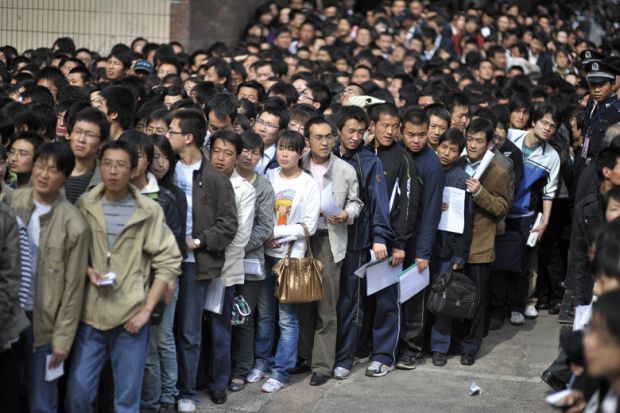Report: Chinese university graduates’ average annual starting salary is barely $8,000


A recent Chinese state media report revealed that the majority of university graduates in China have starting salaries of 4,317 yuan per month ($674), a number much lower than in developed countries. Despite China’s increasing economic prosperity and growth, labor remains cheap, even for the highly educated.
According to this report published by China News Agency on Monday, recent graduates working in high-tech industries fare slightly better: software development and aviation workers, for instance, on average make $976 and $959, respectively, per month.
Despite these paltry numbers, the report recognized that the average starting salary for 2017 university graduates exceeded the average monthly disposable income for urban Chinese residents: $473.
The report lauded the benefits of starting one’s own business: On average, self-employed university graduates earned $157 more. However, only 46.9 percent of start-ups last longer than three years.
Those who are below average
To many — even those who live in this reality — the report was devastating. As one user commented on Sina Weibo, “If these university graduates live in top- or second-tier cities, they won’t be able to survive with 4,317 yuan ($674) in their hands.”
In addition, many commenters suggested that they actually earn less than the reported average. Comments include: “I am the one dragging this number down”; “I only earn 2500 yuan ($390) per month”; “I am a nurse. I earn 2,000 yuan ($312) per month.” Some Weibo users questioned the accuracy of the report: “I think the actual number is way lower than that,” read one comment. “Some number in the 2,000s would be more accurate.”
Even those with relatively well off salaries didn’t find much reason to brag. “I’ve been working for six months. I earn roughly 5,000 yuan to 6,000 yuan ($780–$937) per month. I do not have any savings. I still owe money to Jack Ma.” (It is unclear what kind of debt this Weibo user has from Alibaba, but he may be referring to the online credit system Huabei.)
On top of all this, the cost of living continues to grow in China. The consumption price index on average increased 2.1 percent between 2012-2016. Housing also remains unaffordable to the vast majority of college graduates — even years after they’ve begun work.
Furthermore, a report from May suggests that the employment publicized by universities are likely to be flawed, blaming miscalculations and statistical malpractice. Many university graduates are “forced” to say they are employed, even if they aren’t. According to a BBC report from 2014, “Unemployment among new graduates six months after leaving university is officially around 15 percent. Even that conservative estimate means over a million new Chinese graduates will be jobless.” But the real unemployment rate could be as high as 30 percent — 2.3 million — according to a professor at City University of Hong Kong.
“Six wallets”
Getting off campus and earning one’s first paycheck might be a sign of independence for university graduates, but when the number on that check is too small to make ends meet, supplemental sources of income must be called upon.
In April, China central bank advisor Fan Gang suggested that young people should consider using “six wallets” to buy an apartment, the implication being that young couples will not likely be able to afford a property on their own. Despite the controversy arising from this statement, the reality is that this current generation of graduates are indeed finding it difficult to make it on their own, considering their low incomes and high costs of living.
Chinese President Xi Jinping has vowed to eliminate poverty in the country by 2020. As China’s economic growth rate slows, the country will face tougher obstacles when it comes to wages in the future, for both university graduates and educated professionals.





